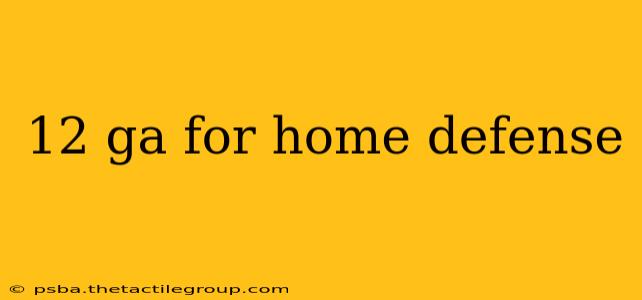Choosing the right firearm for home defense is a serious decision, demanding careful consideration of various factors. The 12 gauge shotgun is a popular choice, but is it the right choice for you? This guide delves into the pros and cons of using a 12 gauge shotgun for home defense, helping you make an informed decision.
The Pros of a 12 Gauge for Home Defense
The 12 gauge shotgun boasts several advantages that make it attractive for home defense:
Stopping Power:
- High-Impact Rounds: 12 gauge shotguns deliver devastating stopping power, significantly higher than most handgun calibers. The large shot spread, especially with buckshot, creates a wider area of impact, increasing the chances of incapacitating a threat.
- Effective at Close Range: Within the confines of a home, the lethal range of a 12 gauge is more than sufficient. The wide spread of shot is less likely to over-penetrate walls compared to a rifle round, minimizing the risk to neighbors or family members in adjacent rooms.
Simplicity and Reliability:
- Ease of Use: Shotguns are generally considered easier to learn and use than handguns, especially under stress. The simpler mechanics reduce the likelihood of malfunctions during a critical situation.
- Robust Design: Pump-action and semi-automatic 12 gauge shotguns are known for their reliability, even in adverse conditions.
Intimidation Factor:
- Visual Deterrent: The sheer size and sound of a 12 gauge shotgun can be a powerful deterrent, potentially preventing a confrontation altogether.
The Cons of a 12 Gauge for Home Defense
While the 12 gauge offers considerable advantages, there are also drawbacks to consider:
Recoil:
- Powerful Recoil: The significant recoil of a 12 gauge can be challenging for some individuals, especially those with less upper body strength or shooting experience. This recoil can affect follow-up shots, particularly crucial in a self-defense scenario.
- Weapon Handling: Managing recoil effectively requires proper training and practice. Improper handling can lead to injury or loss of control during a stressful situation.
Overpenetration Concerns (despite reduced risk compared to rifles):
- Potential for Overpenetration: While less likely than rifle rounds, buckshot can still penetrate walls and other obstacles, potentially causing unintended harm. The use of reduced-recoil ammunition or less-lethal options like birdshot can mitigate this risk, but reduces stopping power.
Storage and Handling:
- Size and Weight: 12 gauge shotguns are larger and heavier than handguns, making them less convenient for quick access and maneuverability within a confined space.
- Storage Safety: Proper storage and safe handling are paramount with any firearm, but especially crucial with a powerful weapon like a 12 gauge.
Choosing the Right Ammunition
The type of ammunition you choose significantly impacts the effectiveness and safety of your 12 gauge for home defense. Common options include:
- Buckshot: Offers the highest stopping power but with increased overpenetration risk.
- Birdshot: Lower stopping power but significantly less likely to overpenetrate.
- Slug: Provides a single, concentrated projectile with the potential for long-range accuracy, although this is less relevant in close-quarters home defense.
Consult with a firearms expert or training professional to determine the best ammunition for your specific needs and circumstances.
Conclusion
A 12 gauge shotgun can be an effective tool for home defense, offering substantial stopping power and reliability. However, its powerful recoil and potential for overpenetration require careful consideration and training. Weigh the pros and cons carefully, factoring in your physical capabilities, experience level, and the specific layout of your home before making a decision. Remember, proper training and responsible gun ownership are paramount. This information is for educational purposes only; always consult with law enforcement and firearms professionals for advice specific to your location and circumstances.

